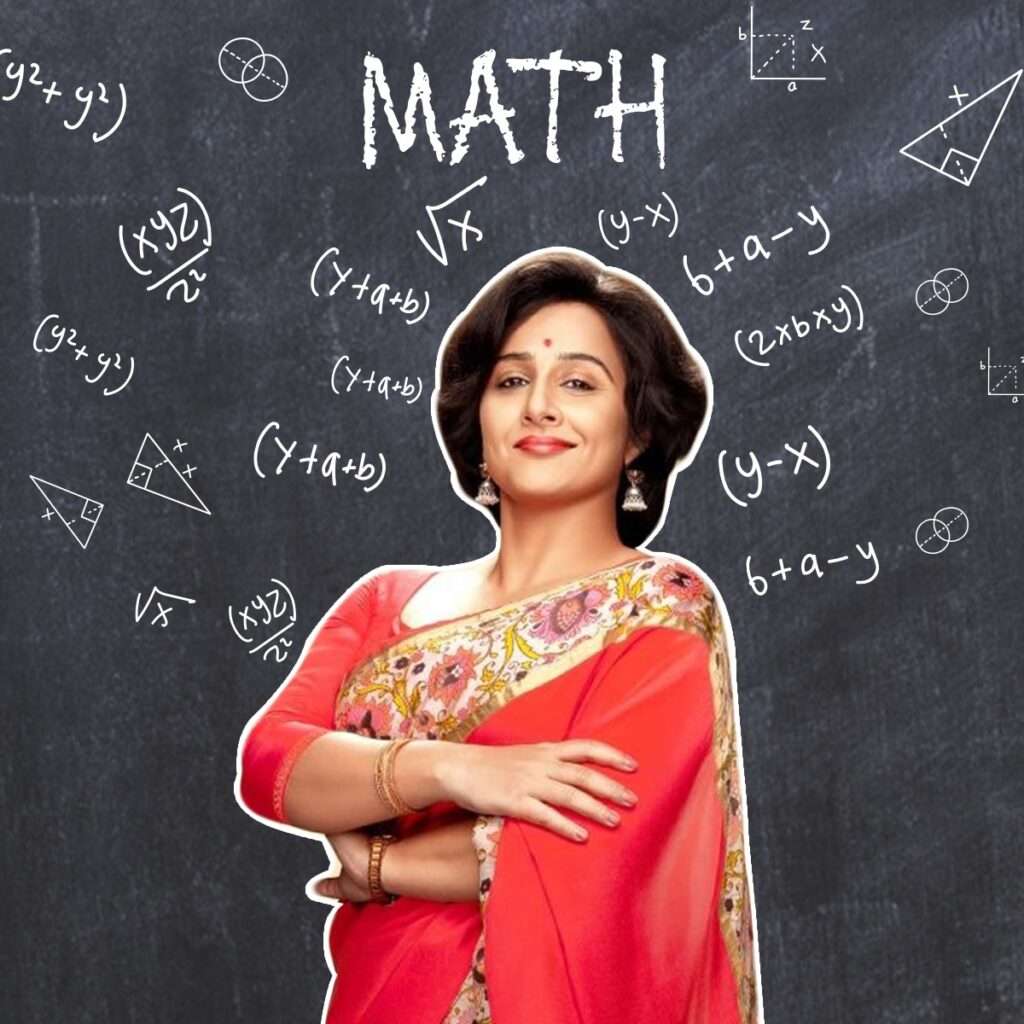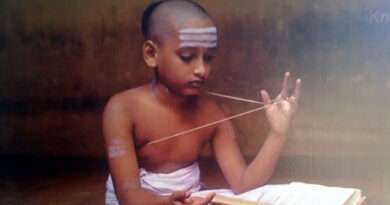Depiction of Shakuntala Devi From A Gendered Lens
By Panchali Kar
If Bollywood is considered as a style or genre of popular films, then the idea of a biopic under the same genre does not fancy me, because it often touches the life of the intended person on the surface, reducing the finer nuances and depths in their story into a linear narrative. The biopic of Shakuntala Devi, written & directed by Anu Menon, was no exception either. The movie hovered around whether Shakuntala succeeded to be a good mother through and through, and her journey through arithmetic just added to the entertainment value to the production. Each time Shakuntala took the podium to solve numeric problems, the audience clenched their fists like watching a Kaun Banega Crorepati eisode, and that’s it. Entertainment, entertainment, entertainment. That’s the only role mathematics had to play in the movie. The intersection of numbers seldom happened with the personal life of Shakuntala, except for the few instances when she blamed her husband or her daughter for making her take a break from mathematics.

It is important to remember that Shakuntala was a prodigal arithmetic genius with no formal coaching, however she never really claimed herself to be a mathematician. Shakuntala was known to be a Human-Computer because of her ability of speed-calculating. However, the movie, that claims to be the biopic of Shakuntala, projects her as a mathematician alongside with keeping the Human-Computer part intact. This slip raises a question in my mind: has the legacy of a strong independent woman been taken for granted for making yet another Bollywood potboiler, and the rest of the movie affirms the same.
The movie started with a promising note where Shakuntala as a kid was seen quashing the normative of parental power and family hierarchy, however her agency over her life became a prop on the screen soon enough. It became a tease with a comical angle. When the official trailer of Shakuntala Devi was released, it did give an impression regarding what to expect from the movie, and the movie thoroughly abided by the same, erasing the intricate details of the persona and replacing it with comic relief, often tad forcefully. Thus the path breaking steps, like Shakuntala fuming against her then boyfriend for betraying with the relationship, or making her place in the male-dominated hostel in London, ends up sketching her character like a tad crazy, tad funny go-getter; while, at the same time, rejecting all the humane angles and emotional baggage that comes with go-getting. Then again, how would the mainstream audience connect, if a female protagonist, living on her own terms, isn’t a tad over the top and crazy, right? Of course, Shakuntala shouldn’t have had any remorse of ending the relationship on violent terms and moving to London, why would she? However, is it possible for a human being to never feel anything about the past chapter, no moment of silence, no introspection, no disgust, no sense of betrayal whatsoever, and to continue to flutter like a butterfly? Of course, a film cannot show everything within the stipulated time, however a choice must be made regarding what is to be shown and why. This film chooses coarse and redundant rudimentary sentiments over the finer intricacies of human life. Well, in an industry, where most of the female characters that are hailed, are nothing but manic pixie counterparts to the larger than life portrayals of the male protagonists, how can we expect better? Agreed that Shakuntala was a witty woman with unconventional ways, unlike how we expect the people in mathematics to be, however what is wit without subtlety? And that is exactly where the film disappoints big time. The on-screen Shakuntala is loud and over the top all the time, irrespective of whether she’s happy, or sad, or irked, or jealous, or whatever. Vidya Balan in & as Shakuntala Devi could even be mistaken for Silk Smitha from The Dirty Picture, or Sulu from Tumhari Sulu. Her mannerisms remained intact. On the other hand, Jissu Sengupta as Paritosh Banerji and Sanya Malhotra as their daughter Anupama Banerji were quite believable.
Probably the only brownie points the movie earns is in the look departments, irrespective of the incorrigible wig, because here Shakuntala is made to age with time. In our glamour-priority art/entertainment industry looking pretty is an unwritten mandatory for the female actors, all the time, hence the females go to bed wearing heavy jewellery, the female actors refuse to look as per the age of their character, because of the fear of losing relevance in the industry. The female actors are even co-opted in the patriarchal standards of grace and beauty; the red lipstick remains spot-on all the effing time, irrespective of whether our “heroines” are running away from a zombie apocalypse or fighting a guerrilla warfare. Looking the part here is necessary and political, and the film did address the de-glamorising with age part, albeit not with perfection, yet it is a commendable move.
IMDB confirms that the story unfolds through the lens of the mother-daughter relationship between Shakuntala and Anupama Banerji. There is nothing wrong with making a movie on a person from a one-sided perspective of another person, who they did not really have a smooth relationship with, however the question remains, does that qualify to be a biopic? Let me explain, why. The story revolves around how much did Shakuntala fail to perform motherhood, which contradicts with the very narrative that the movie itself claims: mathematics is everything for Shakuntala. If mathematics is everything for her, why is motherhood the focus of the movie? What is the relevance? Why is it not okay for a woman to choose ambition over her family? Why is a talented and superlatively intelligent woman to be portrayed as a control freak, selfish, irresponsible, elitist, egoist, shallow human, just because she did not deem fit into the coordinates of mothering? Shakuntala has been demonised for traveling the world leaving her little daughter with the father, as if it is just the mom’s duty to raise a child and the dad was doing that a favour. Even Shakuntala’s popularity in mainstream politics was reduced to one sentence, because the only thing this movie cared about is the threshold of perfect motherhood. Is it because the daughter, who’s the contributor to the plot line, felt neglected, pressurised, overshadowed in her own life due to her mother’s flamboyance? Fair enough, then how come it is a movie about Shakuntala, and not her daughter instead?
The most controversial narrative that the movie puts forward is how it sketches one major turning point of Shakuntala’s life: publication of her book, The World of Homosexuals, around the year 1977, which happens to be the first public academic study on homosexuality by an Indian author. In the film Shakuntala Devi’s daughter Anupama had alleged her mom of lying about her dad’s homosexuality. Shakuntala never rejects the allegation strongly, and responded to her daughter saying, people connect with personal stories, hence these are needed to sell books. Her husband Paritosh Banerji hasn’t been seen to accept that he indeed was gay, and instead, he responded to this allegation as – there is nothing disrespectful in calling someone gay, and that he loved Shakuntala. It needs a wee bit of common sense to understand that the problem here is not with disrespect, but a massive allegation of fraudulent claims, which is a criminal activity. The grey area is kept intact whether the love of Paritosh for Shakuntala was benevolence or was he romantically committed to her. The film never indicates at anything non-heterosexual about Paritosh through the length and breadth of the movie, and their marriage wasn’t shown to be falling apart for sexual differences between them; the reason was her huge ambitions instead. The film purposefully maintained this lack of clarity regarding whether Shakuntala’s husband was really a homosexual person or was it just a gimmick to sell her books; and that is exactly where the film is grossly problematic.
Shakuntala being a wise woman, ahead of her times, why would she write a book on a topic that was a massive taboo in the society, if her purpose were to make the book sellable? Needless to mention that the book barely sold back then, however every single person who’s read the book has claimed it to be a well-researched piece of work. The book ends with a call for decriminalisation of homosexuality in India, through “full and complete acceptance— not tolerance and sympathy,” because of which Shakuntala was thoroughly criticised in the documentary For Straights Only. Of course, Shakuntala wasn’t foolish and she did understand that the book would earn her a bad name. If selling were the only agenda, why would she take all the heck?
Since the movie is based on Anupama Banerji’s narrative about her mother’s life, maybe, just maybe the daughter could not accept the fact that her father was a homosexual man, maybe she lacks the sensitization that her mother had achieved, but what gives a filmmaker the authority to make a film solely depending on the belief system of Shakuntala’s daughter, without minimum research, and pass it on as a biopic of Shakuntala Devi? Just because it is commercial art, it doesn’t necessarily have to be irresponsible, does it?



